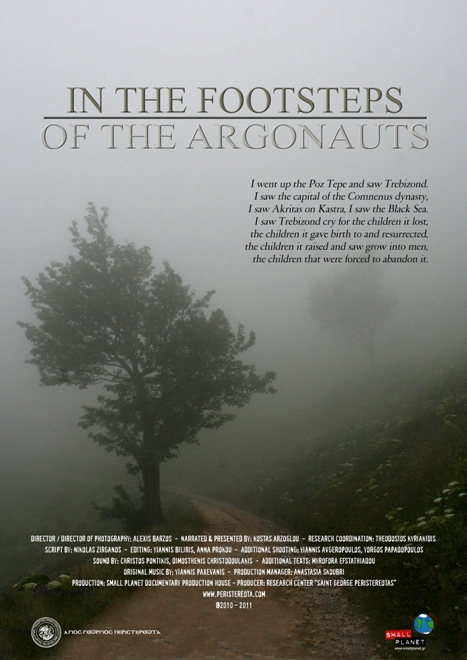
In the Footsteps of the Argonauts
Dir: Alexis BarzosTrabzon (Trapezounta), “the fairest city of all”, as Patriarch John the VIII of Constantinople called it in the 11th century, was the Greek capital of the East for over two millennia. It has been a crossroads for civilizations and commercial relations, a center of military and political interest. At its peak it was the capital of an empire, the Comnenus Empire. This historical documentary records the rise and fall of the civilization of the Greeks of Pontus, which ended with the great persecution and genocide of this population by the Young Turks at the dawn of the 20th century.
Buy the DVD
The DVD of the film is not available at the moment.
Public Screening
Are you interested in organizing a public screening of our film? Send us an email with your inquiry and we will be glad to assist you!
Educational / Library Use
Are you interested in enriching the library of your institution with our film? Contact us and let's create together an informed public!
- DURATION: 59min
- AVAILABLE IN THE FOLLOWING LANGUAGES: English | German | Greek
- AVAILABLE VERSIONS: English (59min) | German (59min) | Greek (59min)
- YEAR OF PRODUCTION: 2010
- Narrated & Presented by: Kostas Arzoglou
- Directed by: Alexis Barzos
- Research & Scientific Editing by: Theodosios Kyriakidis
- Script: Nikolas Zirganos
- Director of Photography: Alexis Barzos
- Original Music by: Yiannis Paxevanis
- Editing: Yiannis Biliris, Anna Prokou
- Production Manager: Anastasia Skoubri
DIRECTOR NOTES
“I went up the Poz Tepe and saw Trabzon. I saw the capital of the Comnenus dynasty, I saw Akritas on Kastra, I saw the Black Sea. I saw Trabzon cry for the children it lost, the children it gave birth to and resurrected, the children it raised and saw grow into men, the children that were forced to abandon it”.
Trabzon, the capital city of the Greeks of Pontus. A crossroads of civilizations that witnessed the development of the Greek Pontic civilization for almost 3,000 years. A historical trajectory which was indelibly marked by the genocide of its populations at the dawn of the 20th century.
Guided by renowned Greek actor Kostas Arzoglou (who is a descendant of that area) as well as with the aid of internationally acknowledged researchers from the National Research Institute and universities of Greece, Great Britain and Cyprus, “In the footsteps of the Argonauts” is the first scientific effort to audio-visually record the memory, tradition and history of Pontus.
The roots of the Greek presence in Pontus disappear in the mist of myth. The journey of Jason and the Argonauts to Colchis, the Amazons, the exile of Prometheus to Caucasus, the confrontation of Heracles with the Stymphalian Birds in ancient Aretiada, the wandering of Orestes in Tonya. They are the first steps of the Greeks in this new and unexplored world.
Already since 650 BC the Greeks begin to spread in the Black Sea, and in approximately 302 BC the Kingdom of Pontus is established, the territory that today’s people of Pontus recognize as their homeland. However, 1204 AC is a milestone in the history of Pontus. It is the year of establishment of the Empire of Trabzon and of the occupation of Constantinople by the crusaders. Trabzon considers its Empire to be the continuer of the legacy of the Byzantine Empire. At about that time, the Black Sea becomes an international sea, as well as the western extremity of the Silk Route. Thus begins the golden era for the Greek population of Pontus. It is a time of prosperity for the Arts and Sciences, the Empire flourishes, the population is on the rise and Trabzon thrives together with its inhabitants.
The Empire is destroyed in 1461 by Muhammad, and the Greek population begins to gradually lose its privileges and is banished. Defenseless, the inhabitants of Trabzon move towards Matsuka, where the three existing monasteries play the role of savior for the Christian population.
With his camera, Alexis Barzos follows on the inaccessible tracks of the pilgrims towards Ag. Ioanis Vazelon, which was built in 270 AC and is considered the most ancient monastery in Pontus. Afterwards, underneath the remains of the Monastery of Peristereotas, with its renowned 7,500-volume library and, finally, at Mt. Melas up to Panagia Soumela, the religious and national symbol of all Greeks of Pontus.
The following three centuries are marked by hard persecutions and massive islamizations of Christians. Many will maintain their faith in secret. They are the so-called crypto-Christians. “To save my life and maintain my faith, by day may I be Ali and by night Ilias. By day Eminé and by night Eleni”, testimonies say.
The Greek population of Pontus begins to flourish once again in 1856, when the Ottoman Empire issues the Hatt-I Hümayun decree, granting privileges to Greeks and other minorities. The community organizes its education, founds cultural, athletic and educational associations, publishes newspapers and magazines. This prosperity will last until the first decade of the 20th century.
The dawn of the 20th century is marked by the great persecution and mass murders of the non-Turkish populations. The rise of the Young Turks is accompanied by incarceration, exile and death. Until 1923, an estimated 1.5 million Armenians and hundreds of thousands of Greeks from Pontus and Minor Asia are murdered. With the population exchange following the Lausanne treaty, over one million leave their ancestral homes. “Our faces are eternally stained because of these expulsions. If expulsions are effectuated in order to murder human souls then, sirs, this is an extremely atrocious matter. It disgraces us before the entire world”, says Hakki Hami Bey, deputy of the Turkish National Assembly.
The Greek population of Pontus was uprooted and, today, the only witness of its centuries-long presence are the remains of the monumental civilization it created. Theodosis Kiriakidis, theologian and historian, says: “Every time we go to Pontus it is like returning to our villages, finding our people. We speak the same language, we dance the same dances, we sing the same songs, we eat the same food, it is truly like finding, once again, our long-lost brothers”.






